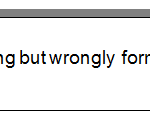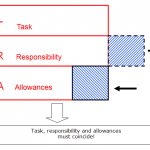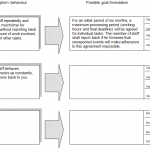Hilft das 4 Ohren Modell von Schulz von Thun auch im Umgang mit anderen Kulturen?
Monthly Archives: Februar 2013
motivation
1. The term "motivation" The word "motivation" comes from the Latin "motivus", meaning to trigger movement. Motivation refers to internal processes (driving forces, needs, attitudes, interests, will) which cause a person to display certain behaviours more often, for longer, more intensively or in a more targeted way (according to Fröhlich & Drever, 1983). Human […]
communications in work prozesses – SUZIBEKUFF
Developed by Ulrich Grannemann Communication in work processes can also be described as production of cognitions. Whether we are talking about conversations, meetings, workshops or entire projects the objective is always the creation of an intellectual product. The basic circle or rough structure of the communication can be described as Input – decision […]
accusation and wishes
A pearl of a sentence: The "basic hardware" of a conflict – whether it is of a professional or private nature – includes those involved making accusations of each other. However, not least thanks to their very structure, accusations are not a suitable way to cause the other person to change his behaviour. […]
conflict levels
Developed by Ulrich Grannemann There are three main types of conflict: 1. Factual conflicts The first level is the so-called factual, content or informational conflicts. Here, there are differences in the view of the world or of reality. There are differences in the scope, depth or even type of information about particular […]
basic agreement
A shared understanding of the basic tasks, responsibilities and decision-making authority is the basis of any organised work and the stabilising foundation of any cooperation. Because they form the basis of our basic understanding of our work, deficiencies in the basic agreement almost always lead to injuries on the relationship level and of course to […]
delegation
Preparatory questions for staff with management responsibility Eight W-rules for delegation: 1. What needs to be done (content)? What are the individual tasks to be achieved? What is the desired result? What are acceptable differences from the desired result? What difficulties can be expected? […]
goals, functions, indicators and types
“Goals describe aspired states in the future.” Functions and purposes Leadership goals intend to create as much agreement as possible on the things to be achieved in the future. 1. Goals therefore have a communicatory function (the supervisor and the co-worker have the same pictures and ideas in mind about future results […]
goal formulation – exercise
Developed by Ulrich Grannemann
advising, supporting and developing staff
A major task for any manager is the support of their staff. One thing which has an effect here is professional development since staff members have tasks which they must work on appropriate to their knowledge and skills and which at the same time constantly enable them to learn new things: "Job […]



